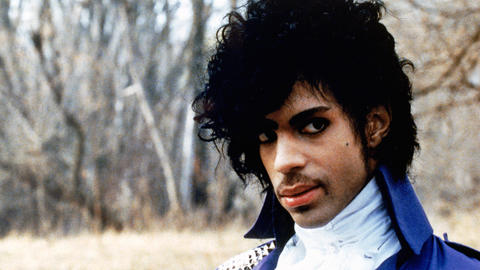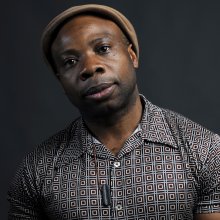
Edson Burton
on Fri 11 Nov 2016Prince: Dance, Music, Sex, Romance - and God
Posted on Fri 11 Nov 2016
In the lead up to our Prince night at Colston Hall, Dr Edson Burton talks about why Prince 'is missed now more than ever'...
In the lead up to our Prince night at Colston Hall, Dr Edson Burton talks about why Prince 'is missed now more than ever'...
In African American folklore the fiddler stands at the crossroads between the natural and supernatural worlds. Prince Rogers Nelson was the modern equivalent, his stringed instrument a guitar, the spirits a realm of deceased innovators that inspired his prodigious talents.
Prince has lavishly been described as an innovator, a pioneer, a singular creative that seemed to descend from the heavens or rise up out of the earth, he was both ahead of and rooted in time. Prince took inspiration from the musical landscapes around him; nu wave, synth pop, glam rock, house, rap (the latter to the amusement of fans who recall his rejection of the genre on the Black Album track Dead On It).
These inspirations, at least those he would admit to, were easily recognisable: James Brown, Little Richard, Sly Stone, Rick James, Jimi Hendrix, Chaka Khan, Mark Bolan, Bowie, Gill Scot Heron, the Beatles to name a few. His falsetto voice was de rigeur among singers of the 70s - the Chilites, the Sylistics, the Impressions, the Bee Gees and his boundary pushing innuendo recalls original 'Nasty Girl' Bette Davis and 'Let Me Be your Rocking Chair' Gwen McGrae.
George Clinton's Parliament played to some extent with queer dressing but this was perhaps more of a desire to push the outlandish than to genuinely explode masculine and feminine binaries. Genre defying Sly and Hendrix also fronted inter-racial bands and out of these influences Prince created a new collage, a combination so vivid so bold that it was if we had seen nothing of its like before.
Few could combine these elements so intensely and effortlessly as Prince, more than a multi instrumentalist he evoked multiple personalities – a guitar wielding half naked Bacchus, a love lorn cupid, a sexual neophyte seduced by seasoned girls, a bed room braggadocio 'with a lion in his pocket', an imp, and a preacher. The identity shifts are as thick and fast as the costume changes in his most expansive shows.
With notable exceptions the concerns in his remarkably prolific career remained consistent. Hits such as Kiss, When Doves Cry and Purple Rain present Prince as a sensual, sometimes tortured, lover, but it is in the tension between romantic and erotic love that we find Prince at his most most searching. Songs such as Head, I'll Jack You off, Let Me Feel You Up leave little to the imagination. Let's Pretend We're Married explores lust at its most brutal - 'I wanna fuck the taste out of your mouth.'
But this intimacy-stripped sex is rendered as a second rate alternative to sex in love. On Purple Rain he laments 'Until I find my righteous one/Computer Blue.' Erotic City resolves 'If we cannot make babies maybe we can spend some time' while even the aforementioned Let's Pretend We're Married opens with the line 'Excuse me but I need a mouth like yours / To help me forget the girl that just walked out my door'.
As epitomised by tracks such as 'Adore You', 'Forever in my Life’ and ‘Purple Rain’ the arc of each album ends with a choice to love. This is not a battle between body and mind rather, like the metaphysical poet John Donne, it’s an attempt to find harmony between the carnal and the spiritual, between God and Earth, between the eternal and fleeting joy. His struggle cuts to the very core of the contrary pulls between a world denying faith and sexual libertarian culture.
Whilst universal this is perhaps a pull most acutely felt by Black communities on both sides of the Atlantic characterised by a residual deep faith and a celebration of earthly love.
A deepening commitment to the Jehovah Witness church tamed the suggestiveness of his music. Funk workout ‘Black Sweat’ and ‘Call My Name’ are relatively restrained compared to the multiple orgasmic long players ‘Do Me Baby', ‘International Lover’ and ‘Insatiable’. Other explorations seem also to have found their resolve, the questioning 'Am I Black or White am I Straight or Gay?' are absent from his later work.
But it would be wrong to portray Prince as an artist solely concerned with matters spiritual or sexual. Social consciousness was never far from his work. 'You’re Gonna Have to Fight your own Damn War cause we don't want to fight no more' he declares on the frenetic jam ‘Party Up’, the final track on the Controversy Album.
‘Sign of the Times' is self-explanatory, while later songs – ‘We March' 'Family Name' - firmly placed him within an African American resistance struggle. Remaining relevant to the end, the opening track to his last album Baltimore is a stirring tribute to the Black Lives Matter Campaign – ‘If there ain't no justice there ain't no Peace’.
The fire that made Purple Rain and Sign of the Times such timeless albums, understandably, did not burn evenly during his long career. Yet Prince remained a ferociously restless artist constantly searching for new sounds, new ensembles, new ways to confound and marvel on stage and in the studio.
The search for the new cost him easy acclaim. Following on from the success of ‘Purple Rain’, rock and funk fans were perplexed by the psychedelic ‘Around the World In a Day'. More to the point his disregard for formulaic recreations brought Prince a protracted dispute with his label.
Ultimately he created for himself and hoped we would dance to his tune. In the process he built a following that transcended race, class, gender and sexuality. Looking around at a Prince concert one sees a rainbow society no one nation rhetorician can produce. He is missed now more than ever.
